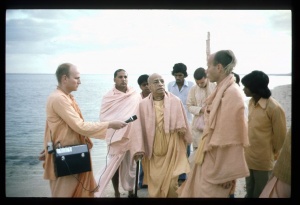SB 1.6.25

A.C. Bhaktivedanta Swami Prabhupada
TEXT 25
- etāvad uktvopararāma tan mahad
- bhūtaṁ nabho-liṅgam aliṅgam īśvaram
- ahaṁ ca tasmai mahatāṁ mahīyase
- śīrṣṇāvanāmaṁ vidadhe 'nukampitaḥ
SYNONYMS
etāvat—thus; uktvā—spoken; upararāma—stopped; tat—that; mahat—great; bhūtam—wonderful; nabhaḥ-liṅgam—personified by sound; aliṅgam—unseen by the eyes; īśvaram—the supreme authority; aham—I; ca—also; tasmai—unto Him; mahatām—the great; mahīyase—unto the glorified; śīrṣṇā—by the head; avanāmam—obeisances; vidadhe—executed; anukampitaḥ—being favored by Him.
TRANSLATION
Then that supreme authority, personified by sound and unseen by eyes, but most wonderful, stopped speaking. Feeling a sense of gratitude, I offered my obeisances unto Him, bowing my head.
PURPORT
That the Personality of Godhead was not seen but only heard does not make any difference. The Personality of Godhead produced the four Vedas by His breathing, and He is seen and realized through the transcendental sound of the Vedas. Similarly, the Bhagavad-gītā is the sound representation of the Lord, and there is no difference in identity. The conclusion is that the Lord can be seen and heard by persistent chanting of the transcendental sound.